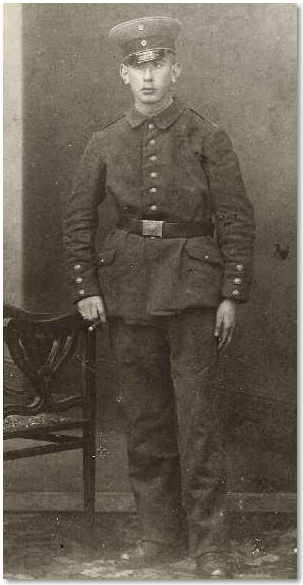In spite of the nasty and painful experiences, which he endured in Nentershausen
during the “Nazi Era”, Willy Katz never forgot his hometown and place of birth. This
was shown in a report from Professor Wilhelm Schwarz, born in Iba, who later
lived in Canada and visited Willy Katz in Israel in 1979. He stated in his article;
“there were hanging on the wall in his apartment in Petach Tikvah a photograph
from Nentershausen, where he was born in 1898 and where his family had lived
for over 200 years as leather tanners and shoemakers. Another picture showed
his mother as a beautiful young woman. She was born in Baumbach and is
buried in Nentershausen. A third picture showed Willy Katz as a very young recruit
in the uniform of the Emperor, shortly before the end of the First World War. In his
pocket he carried, next to his Israeli passport, a German identification card. What
does he think about, and occupy his thoughts during the day when he sits and
rests? When I called him on the telephone after my arrival, he already started
asking me what was new in Nentershausen and in Iba, where I had been visiting
shortly before. We sat in his apartment and conversed about mutual
acquaintances – alive and dead. Willy Katz still remembers all of them, the people
from Nentershausen, Bauhaus, Sűss, Iba, Solz, Dens, Mőnchhosbach and
Rockensűss. All over, he used to sell his shoes, first by foot, later on a bicycle and
even later, after the First World War, by a horse-driven wagon. He still can
remember all of them. He remembers when the sister of my grandmother
married, he knows that an aunt of mine,
Mrs. Gebhardt, lived in the Elzebach in Nentershausen, the same street on which
he lived up to 1940. I mentioned to him that even today, 25 years after I left my
hometown, I am still homesick. I have the same problem, said Willy Katz. I just
cannot tell anybody about it, because otherwise my grandchildren laugh at me.
Homesickness for Germany, for Nentershausen – What, have you lost it? With 42
years, Willy Katz had to learn Spanish, with 75 years he came to Israel. Hebrew he
does not know. He puts on the television program, however, he mutes the sound,
he cannot understand it anyway. For a while we spoke in the Hessen dialect
(Mundart), which he had not forgotten. ‘Er schwatzt wahrhaftig noch wie wir’ (he
really still talks just like us) supposedly yelled a lady farmer from Iba when she
saw Willy Katz again, after 40 years. ‘One should not move an old tree’, he said
while showing that he was somewhat tired. After that he wrote on a piece of paper
10 to 12 names, people from Nentershausen and Iba, to whom he wanted me to
give his personal regards. He said ‘good people, good people’ and his wife,
Martha, agreed with him. From the bus, to where he accompanied me, I saw him
once more walking across the street, tall, opulent, full of life, waving a friendly
good-bye. A Nentershausener in Israel”.
Willy Katz as “very young recruit”
in World War I (as a wall picture in his
apartment in Israel).

